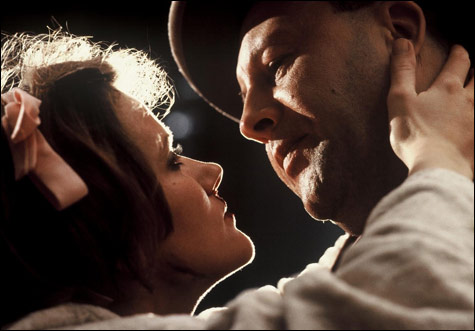
FASSBINDERIANS REJOICE: Berlin Alexanderplatz is meant to express a psychological inferno, and it succeeds. |
| Berlin Alexanderplatz | Directed by Rainer Werner Fassbinder | Written by Fassbinder based on the novel by Alfred Döblin | with Günter Lamprecht, Karlheinz Braun, Hanna Schygulla, Barbara Sukowa, and Claus Holm | German | Bavaria Film International | 939 minutes |
Fassbinderians rejoice — your crucifixion, your tribulative martyrdom, has arrived, in the restored re-release of a little ordeal called Berlin Alexanderplatz (1980), the definitive altar upon which to test your faith in cinema. Non-Fassbinderians — will you dare? Infamous for its willfully unwieldy size (15-1/2 hours), the film qualifies as a cultural behemoth, a work that demands a revision in our method of watching, experiencing, and assessing cinema. It’s a pivotal giant in a very peculiar subgenre of arthouse movie — the TV mini-series-as-all-in-one-auteurwerk, alongside Bergman’s uncut Fanny and Alexander, Wolfgang Petersen’s uncut Das Boot, Kieslowski’s The Decalogue — but like all extremely long films, Rainer Werner Fassbinder’s rampaging mega-work becomes, eventually, about its own length. Any film longer than, say, five hours inevitably calls its own basic shape and length into question, risking tedium and repetition but striving for experiential revelations and immersions for which ordinary mortal movies cannot hope. Some films use extreme time to disrupt our sense of reality (this is one facet of Jacques Rivette’s career scheme); others try to capture the breadth of an ambitious novel, neglecting the point that no one reads Dickens or Joyce or Mann in one or two sittings. (Hence the weekly broadcast mode, which shouldn’t be dismissed.) Taken as a whole, Fassbinder’s magnum opus — adapting the 1929 novel by Alfred Döblin that haunted Fassbinder his whole life, and that emerges in signs and fragments in many of his other movies — is not an alternate reality so much as a near-endless mildewy-bell-jar briefing for a descent into Hell, in an already hellish Weimar Germany, where women are bawling trash, men are lurking hyenas, and the world is a combustion engine run on souls.It’s meant to express a psychological inferno, and it succeeds. (The first chapter, as in the book, is titled The Punishment Begins.) Fassbinder’s keening, in-your-face post-Sirk theatricality is an acquired taste (has anyone pointed out how his later films scan like a Leone-Morricone portrait of German lowlife?), and this is the harvest crop, epic in length but terrifyingly claustrophobic scene by scene, episode by episode, a nightmare of clueless doom in which Berlin is often reduced to a flat and a bar room photographed in the ocher haze of an opium den. What happens is like the slo-mo footage of a fatal car wreck: Franz Biberkopf (Günter Lamprecht), a great, bullish, dim lug of a man, is released from prison (he’s done a stint for manslaughter) and thrust back into his old life of pimping and violence. From the start, it’s clear that Biberkopf is unhinging, and as the hours press on and his struggle to stay honest and happy becomes truly hopeless, the film takes on the aura of a saintly tribulation. Indeed, Döblin’s novel, which ran neck and neck with the montage-of-voices experiments of Joyce and Dos Passos, is an existential tragedy about the post-war culture as much as about its protagonist, and Fassbinder goes for maximum iconicity. He helplessly loses much of the book’s tumultuous scope (as it was, the film was humonguously expensive for German TV, but how much bigger could it possibly have been?), training in instead on its hero, who in the uncomprehending, porcine person of Lamprecht becomes, 15 hours later, embedded in the brain like a fossilized footprint.